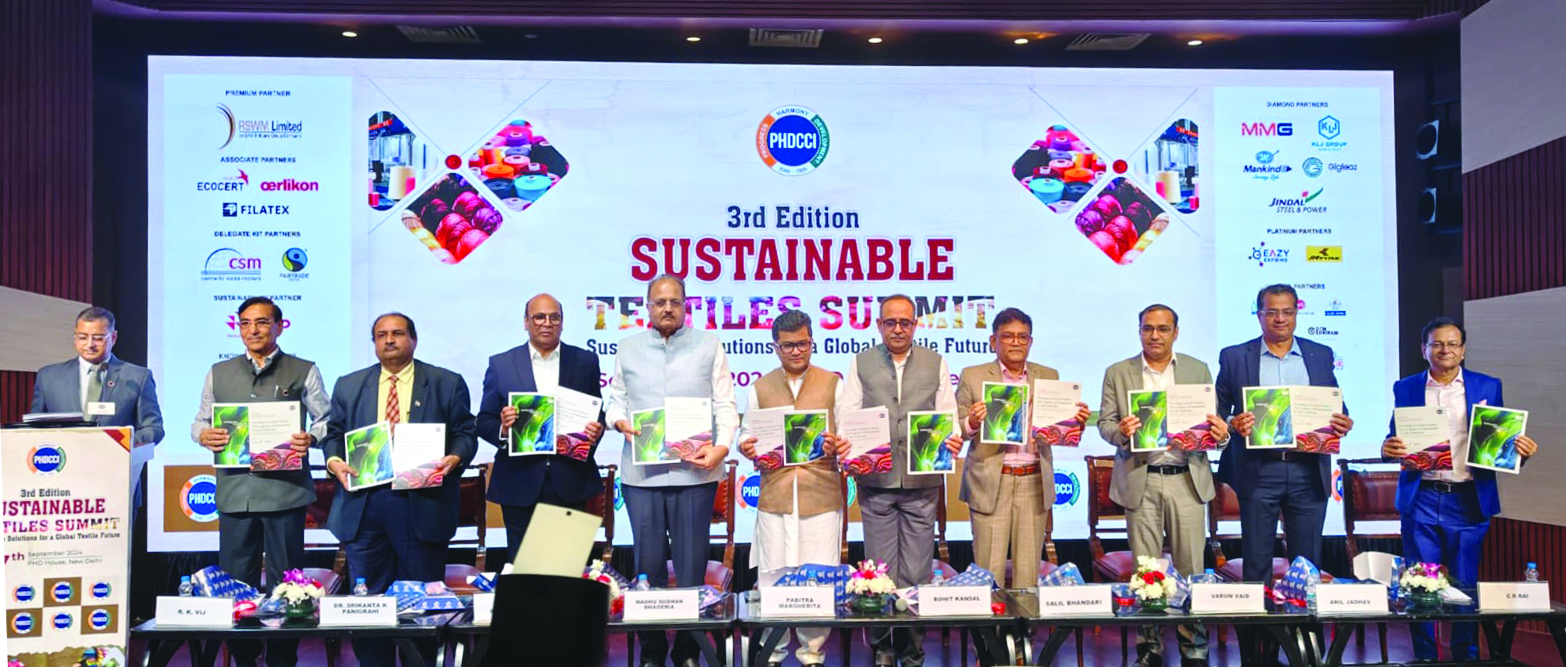
Mumbai, 18 September 2024: RSWM Limited, the flagship company of the LNJ Bhilwara Group, strengthened its commitment to the sustainability journey by launching its comprehensive Sustainability Report at the 3rd Sustainable Textile Summit, hosted by the PHD Chamber of Commerce and Industry. The report was unveiled by Mr. Pabitra Margherita, Hon’ble Minister of State for Textiles, Govt. of India, and Mr. Rohit Kansal, Additional Secretary, Ministry of Textiles, Govt. of India, showcasing RSWM’s ongoing commitment to environmental responsibility and sustainable textile production.
Smt. Roop Rashi, Textile Commissioner of India, Ministry of Textiles, Govt. of India, was also present at the summit, along with other dignitaries and industry leaders who commended RSWM’s proactive approach to sustainability. The newly launched report highlights the company’s key initiatives in circular economy practices, carbon footprint reduction, and innovations in green textile manufacturing. Guided by the philosophy of giving back to nature, RSWM’s approach centers on the principle of reducing, reusing, recycling, and replenishing natural resources, reflecting its long-standing leadership in sustainable practices.
Report Link: https://story.rswm.in/report/RSWM_Sustainability_Report_LR_2.pdf
Addressing the global plastic waste crisis, RSWM recycles approximately 1,830 million PET bottles each year, converting them into 51850 MT of recycled polyester fibre. This effort significantly reduces landfill waste and supports the creation of sustainable textile products. To further reduce fossil fuel consumption, RSWM consumes 8,818 metric tons of biofuel annually, derived from dry husks. This initiative highlights the company’s dedication to using sustainable alternatives in its manufacturing processes.
In addition to these key sustainability initiatives, the company also follows Zero Liquid Discharge strictly where they have implemented advanced multi-stage treatment plants in its facilities, resulting in the annual saving of approximately 23,36,792 kilolitres of water. In its quest to minimize reliance on traditional energy sources, RSWM has adopted solar and wind power, utilizing 76.5 million kilowatt-hours of green energy annually. This shift not only reduces dependency on local power grids but also contributes to national energy sustainability.
RSWM has achieved an annual reduction of 800,000 metric tons in CO2 emissions through various energy-efficient practices, showcasing the company’s proactive approach to mitigating climate change. Additionally, RSWM focuses on the upcycling of textile waste by incorporating 8,162 metric tons of recycled cotton into its production processes each year, promoting the sustainable use of resources in the textile industry. In its commitment to sustainable greenery, RSWM uses 72,357 kilograms of organic manure and fertilizers annually, enhancing soil health and reducing the environmental footprint of its agricultural inputs.
Mr. B.M. Sharma, Jt. Managing Director, RSWM Ltd. said, “Our approach to sustainability extends beyond merely meeting regulatory requirements; it represents our dedication to initiating significant change within the industry. Sustainability is not just a business mandate but a core part of our culture, deeply ingrained in our operations. From decisions on whether to discard or reuse, we strive to embed sustainability into every aspect of our business.
We believe that transparency is crucial, and we are committed to reporting our progress through various channels, including social media and internal reports. It is essential to maintain a balance sheet that reflects what we take from nature and what we give back. Allocating dedicated budgets for sustainability within our annual plans is a priority for us. We aim to make sustainability a central value, not only as a corporate responsibility but as a cultural principle that demonstrates our commitment to protecting the environment for future generations.”
RSWM’s sustainability journey is marked by continuous innovation. The company is expanding its use of sustainable fibers, including organic and recycled cotton, linen, hemp, jute, silk, and more. These efforts are part of a broader strategy to revolutionize the textile industry by integrating sustainability into every aspect of its operations.

